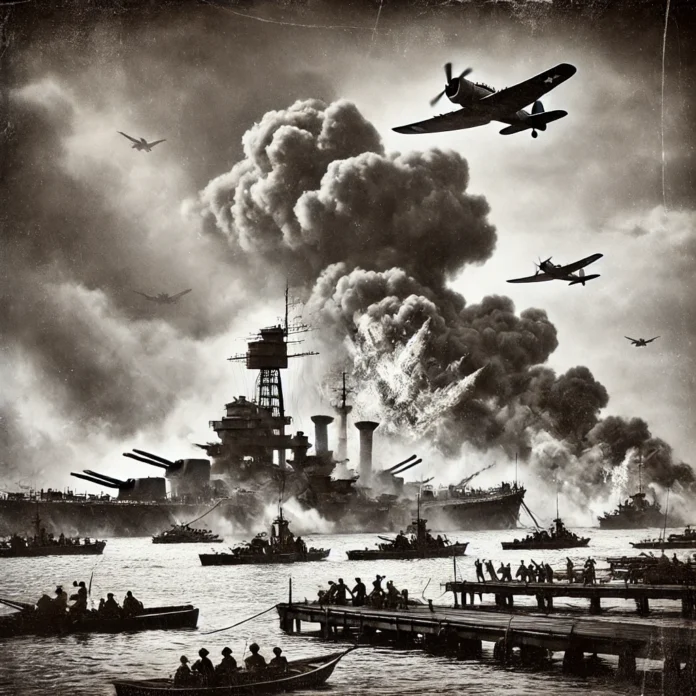On December 7, 1941, the tranquil Sunday morning skies over Pearl Harbor, Hawaii, erupted into chaos and destruction. Today, we honor the 83rd anniversary of the attack on Pearl Harbor—a day that transformed the course of history and the destiny of nations. As we remember those who perished and reflect on the courage displayed by the “Greatest Generation,” we must revisit the tragic yet pivotal events of that day to appreciate its enduring significance.
The Attack: What Happened, When, and Where
At 7:55 a.m. local time, the first wave of Japanese aircraft descended on the U.S. naval base at Pearl Harbor. The attack, planned with meticulous precision, aimed to cripple the U.S. Pacific Fleet and clear the way for Japan’s expansion across the Pacific. Within two hours, over 350 Japanese aircraft, launched from six aircraft carriers, rained devastation on the unsuspecting base.
The scale of destruction was staggering:
- Eight battleships, including the USS Arizona and USS Oklahoma, were either sunk or severely damaged.
- Three cruisers and four destroyers were also hit, along with nearly 200 aircraft destroyed on the ground.
- 2,403 Americans—service members and civilians alike—lost their lives, with another 1,178 wounded.
The USS Arizona remains a solemn underwater grave for over 1,100 sailors and Marines who perished when the battleship exploded and sank. Today, the ship’s remains serve as the centerpiece of the Pearl Harbor National Memorial, a stark reminder of the sacrifices made.
Why It Happened: The Road to December 7, 1941
The attack was the culmination of rising tensions between the United States and Japan, driven by clashing ambitions in the Asia-Pacific region. By the late 1930s, Japan, under militaristic leadership, had embarked on an aggressive campaign to dominate East Asia, invading Manchuria in 1931 and China in 1937.
The U.S. viewed Japan’s expansion as a threat to its interests and allies in the region. In response, the Roosevelt administration imposed economic sanctions, including an embargo on oil, which was vital to Japan’s war machine. Faced with dwindling resources and determined to secure dominance in the Pacific, Japan’s leaders saw war with the United States as inevitable and sought to deliver a preemptive blow.
What Happened Next: From Isolation to Action
The attack on Pearl Harbor shattered America’s isolationist stance. President Franklin D. Roosevelt, in his address to Congress on December 8, famously called December 7 “a date which will live in infamy.” Congress responded by declaring war on Japan, catapulting the United States into World War II.
Three days later, Germany and Italy declared war on the United States, solidifying the global conflict. The American war effort mobilized unprecedented industrial and military resources. Millions of men and women served in the armed forces, while the nation’s factories churned out planes, ships, and weapons at a staggering pace.
Pearl Harbor also catalyzed major shifts on the home front. It prompted advancements in military strategy, intelligence (e.g., the establishment of the Office of Strategic Services, a precursor to the CIA), and technology, including radar. However, it also led to dark chapters, such as the internment of Japanese Americans, a grievous violation of civil liberties.
Victory and the Legacy of Pearl Harbor
The attack galvanized the U.S. into becoming a leading global superpower. By 1945, the Allied forces, bolstered by American military might, had defeated the Axis powers. The war’s conclusion saw the establishment of the United Nations and a new world order aimed at preventing future conflicts.
Pearl Harbor’s legacy continues to resonate:
- National Security: The attack reshaped U.S. defense policy, leading to the establishment of a permanent military presence in the Pacific and a commitment to global engagement.
- Historical Remembrance: Each year, the nation pauses on December 7 to honor those who gave their lives and to reflect on the lessons of vigilance and unity.
- Veterans and Survivors: The few remaining Pearl Harbor survivors remind us of the human cost of war and the resilience of those who endured its horrors.
Why Pearl Harbor Matters Today
Pearl Harbor serves as a stark reminder of the fragility of peace and the importance of preparedness. It also underscores the value of international alliances, as the post-war world saw the rise of enduring partnerships like NATO and the U.S.-Japan alliance.
More profoundly, Pearl Harbor symbolizes the indomitable spirit of the American people. The resilience and unity displayed in the wake of the attack remind us that, even in the face of tragedy, a commitment to liberty and democracy can prevail.
Conclusion: Bearing the Flame of Freedom
As we lower flags to half-staff today, we honor not only the lives lost at Pearl Harbor but also the ideals they defended. President Biden’s proclamation emphasizes the sacred obligation to care for veterans and their families, an enduring commitment born out of the sacrifices made during World War II.
Let us remember Pearl Harbor not only as a tragic moment in history but as a turning point that awakened the world to the cost of freedom and the strength of democracy. The lessons of December 7, 1941, remain as relevant today as ever, calling us to vigilance, unity, and the relentless pursuit of peace.
Further Reading and References
- White House, “A Proclamation on National Pearl Harbor Remembrance Day, 2024,” December 6, 2024. White House (Retrieved: December 7, 2024).
Disclaimer: This article is an opinion piece that provides analysis, commentary, and educational insight on recent news topics, informed by reliable sources. It reflects the author’s sole opinion, and neither the newspaper nor its website, as a news, commentary, and educational platform, bears responsibility for any misinterpretation or consequences arising from this analysis. For the latest breaking news and official results, refer to the news organizations cited above. This article does not constitute primary reporting.




